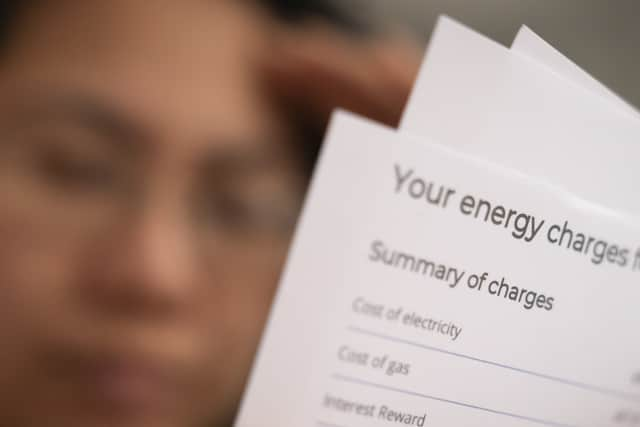Ofgem raises energy price cap to £4,279 - but households protected by energy price guarantee
and live on Freeview channel 276
The energy price cap is set to rise by 20% in January 2023 hitting £4,279 for an average household, the regulator Ofgem has announced.
However, the decision will not impact the amount households pay for their energy because the government has said electricity will cost 34p per unit and gas will be 10.3p until April. The government’s energy price guarantee scheme (EPG) means typical bills will remain at £2,500 a year on average until April 2023.
Advertisement
Hide AdAdvertisement
Hide AdThe energy price cap changes every three months and is rising due to the ongoing high price of wholesale energy. However, no one currently pays the full amount under the price cap, as the energy price guarantee gives a discount off these rates to all households.
Without the government support the average household would be paying around £4,279 for its energy under the new cap.


Energy is charged per unit, so those who use more can spend more.
The consultancy Cornwall Insight has predicted that the EPG will cost the government £42 billion in its entirety. It expects the Ofgem cap to reduce to £3,921 from April and then to about £3,400 for the last six months of 2023.
Advertisement
Hide AdAdvertisement
Hide AdMoneySavingExpert Martin Lewis said on Twitter: “The Jan energy price cap is almost totally meaningless for consumers’ bills.”
He added: “Of course, while meaningless for consumers, the fact the state is paying means if it rises either bigger borrowing or taxes.”
According to a senior utilities expert at MoneySavingExpert, the average prices will remain at the same level but you may see a slight difference in the rates you pay. This is because there are regional differences in Ofgem’s price cap rates, which change each time the regulator revises the cap. As the energy price guarantee is a flat unit rate reduction for everyone, regardless of which region you’re in, you might see a small difference to the rates.
What is the government’s ‘Energy Price Guarantee’ scheme?
The scheme is a flat discount on the rates under Ofgem’s October price cap. The government took Ofgem’s rates and applied a discount of around 4p per kilowatt (p/kWh) on gas unit rates, and 17p/kWh on electricity unit rates (standing charges remained at Ofgem’s planned level), which is paid to the energy suppliers and passed on to households.
Advertisement
Hide AdAdvertisement
Hide AdWith this discount, someone on typical use pays £2,500/year, rather than the full £3,549/year under Ofgem’s price cap methodology. This means the state is essentially subsidising the difference.
Now that Ofgem’s price cap is set to change again in January, the government will increase the level of the discount, to keep it at a typical £2,500 a year. This means the government will have to subsidise more of the cost.
According to the MoneySavingExpert website, it is important to note that the £2,500 a year figure is based on what a ‘typical’ household would pay over a year. If you use more than that, you will pay more - if you use less you will pay less.
In the autumn statement the Chancellor announced that the government’s EPG will change again in April 2023. The level of support on energy bills will be reduced, meaning prices will rise by 20%. From 1 April, a typical household will pay £3,000 a year and this level of support will continue until March.
The government confirmed that if Ofgem’s prices fall below the level of the energy, households would pay the lower level.
Comment Guidelines
National World encourages reader discussion on our stories. User feedback, insights and back-and-forth exchanges add a rich layer of context to reporting. Please review our Community Guidelines before commenting.
